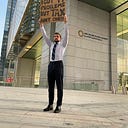UAE Family Offices winning the support of older generations for new approaches to alternative investing.
I am one of the much-maligned ‘millennials’ whom posts weekly pictures on the internet of smashed avocados on toast — people born between 1982 and 2004, who came of age in the 21st century. Over the next few years my generation will be preparing ourselves to take on the largest inter-generational transfer of wealth in history from our baby boomer parents. We are, however, a very different bunch from our parents, so there will be challenges, changes, and concerns for family businesses where millennial family members are set to inherit the management of both the family’s personal and business assets.
Right now in the United Arab Emirates, I am experiencing millennial ran Family Offices that are increasingly aware and cautious of global economic and financial issues. They have witnessed firsthand a significant increase in political and economic uncertainty, and these events have shaped the way they now view wealth planning. For example, most millennials are well educated on the global financial crisis of 2008 and its impact on markets. This crisis was caused by the investment and financial decisions of the generation before them and millennials have as a result become wary of both traditional institutions and long term financial investments. They don’t trust forecasts, promises of future rates, or economists. Many of my generation now seek alternative investment options with shorter term gains. This is a stark comparison to our parents’ generation, who heavily invested in traditional, long-term financial products.
Since the financial crisis, traditional methods of investment and financial planning will be required to change. Alternative and more diverse investments will need to be catered for, along with an increase in luxury assets such as private jets, yachts, cars, art collections, and jewelry. We can also expect more of these investments, and the succession planning to be built around them, to be done with an increased focus on impact investing or sharing those assets with a broader set of beneficiaries.
Winning the support of older generations for new approaches to wealth management is not always easy. But as younger family members take up the reins at family offices, many are asking one question: how can they put more of their family’s wealth to work for good? There was a time when the answer might have been to write bigger philanthropic cheques. But for this generation, market-based tools such as ESG (environmental, social and governance) investing and impact investing are far more appealing. Whether funding a school for girls in rural India or a wind farm in Spain, these investments aim to produce both a financial return and a social or environmental impact. The model we had in the past was that you made your money, then spent the rest of your life giving it away. This next generation of entrepreneurs and impact investors believe that is an outdated model.
In such cases, younger family members need a plan. First, this requires changing how they communicate with their elders, presenting impact investing as simply a new way of doing what the family has always done. One must remember, the younger generation want to do impact investing because their parents raised them right.
The model that might define the family office in the 21st century is likely to be those investment groups that change their traditional mentality when it comes to investing. As such, these families might just be behind the big innovations and companies of tomorrow.
#FamilyOffice #Investing #UAE
